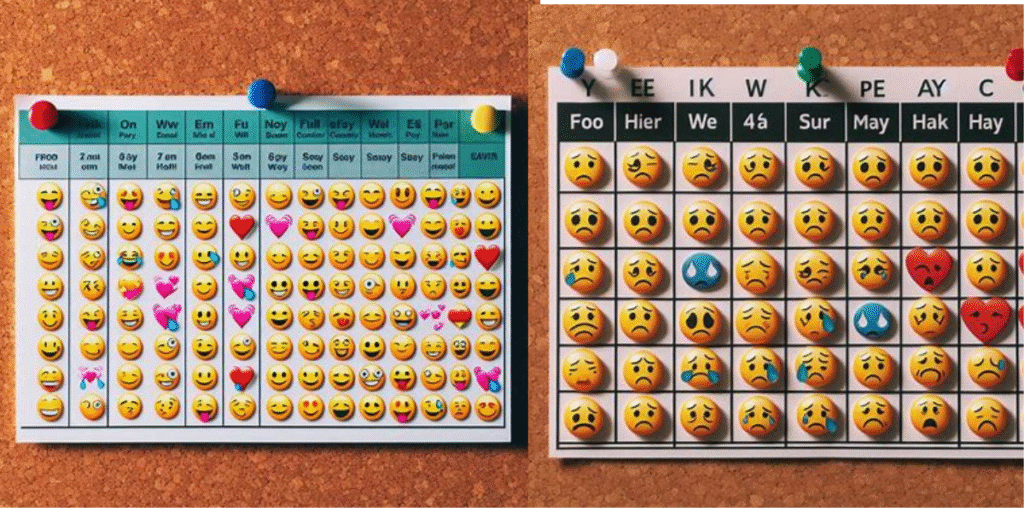Parenting isn’t something you master; it’s something you live through, moment by moment.
Some nights, after the kids finally fall asleep, we sit quietly in the dark wondering if we’ve done enough. Did we listen deeply? Were we patient? Did we show love in the right way?
That quiet self-questioning is where mental health for parents and children begins.
It’s the awareness that both parents and kids are navigating emotions, learning balance, and building resilience together.
The Real Meaning of Parenting with Empathy
Empathy in parenting starts where perfection stops.
It’s not about never raising your voice or always knowing the answer. It’s about recognizing emotions—yours and theirs—with compassion.
- When you pause before reacting.
- When you breathe instead of shouting.
- When you choose understanding over control.
That’s the magic moment.
This daily awareness forms the foundation of mindful parenting strategies, small, intentional acts that protect the emotional core of a family.
The Emotional Cost of Modern Parenting

Let’s be honest—modern family life is overwhelming.
Between deadlines, chores, and screens constantly demanding attention, families run on exhaustion rather than connection.
Here’s what happens silently in so many homes:
- Parents swallow their feelings to stay strong.
- Children sense unspoken stress and confuse it with rejection.
- Everyone ends the day running on emotional fumes.
Creating space for mental health for parents and children means slowing down enough to actually feel again. It calls for stillness, communication, and a little self-compassion, things that seem simple but transform everything.
The Day I Realized Empathy Starts With Me
A few years ago, I had what I call my breaking-and-awakening day. My son accidentally shattered my phone. I was already tired, anxious, and behind on a deadline, and I yelled.
The look in his eyes—fear mixed with confusion, broke me far more than the screen did.
That night I cried, not because of guilt, but because I realized something vital: You can’t teach calm without practicing it.
Since that day, I’ve built my days around mindful parenting strategies. I still mess up, but I recover quicker, apologize faster, and stay more aware.
This shift didn’t just heal my child, it healed me too.
“Parenting is not about being flawless; it’s about showing up with a heart
Brave enough to heal its own wounds while holding a child’s hand.”
Why Emotional Awareness Feeds Family Well-being

When mental health for parents and children becomes a household priority, emotional safety replaces chaos.
Kids stop walking on eggshells. Parents stop drowning in guilt. Families start breathing in sync again.
Emotional awareness gives everyone permission to feel. Here’s how it helps in daily life:
- Parents notice triggers instead of reacting to them.
- Children learn empathy through everyday modeling.
- Small acts of mindfulness replace constant correction.
- The whole family’s stress level naturally drops.
This emotional transparency is where healing settles in, and real connection begins thriving.
MUST READ: Types of Parenting Styles and Effects on Children
Everyday Mindful Parenting Strategies That Work
You don’t need a major life shift to nurture calm and closeness. You need consistent rituals rooted in empathy.
Here are practices that gently transform the emotional climate of your home.
- Pause Before Responding
When chaos hits, stop for two slow breaths. Choose presence over panic. - Validate Feelings, Don’t Correct Them
Instead of saying “Don’t cry,” try “I know this feels hard.” This single shift teaches acceptance. - Repair Moments Promptly
When you lose your temper, own it. A simple “I’m sorry” builds trust faster than perfection ever could. - Create Calming Rituals
Ten minutes of bedtime storytelling or shared gratitude resets connection daily. - Name Emotions Together
Use colors, metaphors, or “feeling jars.” It helps kids freely express without fear of judgment. - Prioritize Presence Over Productivity
No activity matters if everyone’s emotionally absent. Choose eye contact over endless multitasking. - Keep Soft Spaces at Home
A corner with soft lights or a calming scent helps regulate feelings when emotions run high.
Slowly, these mindful parenting strategies reshape family culture, from chaos-driven to connection-driven.
A Lesson from a Struggling Mother
I once spoke to a mother of two who felt trapped in guilt. She loved her kids deeply, yet she confessed, “I feel like I’m failing every day.”
We worked together on emotional naming and gratitude journaling. Three months later, she sent me a message:
“Our home feels lighter. We laugh again. I see my kids not as extensions of me, but as little humans learning.”
What changed wasn’t her routine—it was her relationship with her own emotions.
This is what happens when mental health for parents and children becomes a focus instead of an afterthought. It doesn’t just improve family happiness; it rebuilds emotional trust.
Creating Emotional Sanctuary Within Your Home

A home is more than walls and furniture, it’s the emotional atmosphere shaping every family member’s wellbeing.
An emotional sanctuary is a space where vulnerability is welcomed, and healing feels natural.
To foster such a sanctuary:
- Encourage moments of quiet presence together, like sharing morning coffee or evening reflection, turning routine into ritual.
- Use soft textures, calming colors, and natural elements that invite relaxation and reduce stress subconsciously.
- Cultivate open dialogue zones—corners or nooks where anyone can speak freely without fear of interruption or judgment.
- Practice active listening daily, reinforcing that everyone’s feelings are valid and worthwhile.
These acts may seem subtle, but they align perfectly with mindful parenting strategies that nurture long-term family stability.
A mindful home doesn’t need to be quiet—it just needs to feel safe.
The Power of Honest Repair
Parenting is filled with mistakes. Every apology, every “I wish I handled that differently,” is a small repair stitch in the family fabric.
Repair creates resilience. Kids who witness parents owning emotions grow into adults who communicate responsibly.
Every time you choose honesty over shame, mental health for parents and children becomes stronger.
It’s not about removing pain, it’s about walking through it together.
Thought-Provoking Reminder
“Children don’t need perfect parents; they need present ones who keep trying.”
That’s it. That’s the real definition of empathy. Try again. Show up again.
That is what love feels like when it grows wiser with time.
Healing Begins With the Parent First

We often talk about helping our children manage emotions. But true family healing starts with the parent finding calm first.
Forgive yourself for impatience. Celebrate repair. Notice beauty in the small, unfiltered moments.
When parents honor their humanity, they invite children to do the same.
That’s what evolution through empathy looks like.
And in that space of softness, the union between mindful parenting strategies and mental health for parents and children creates lasting peace.
FAQs
1. What does mental health for parents and children actually mean?
It means both generations learning emotional regulation, communication, and resilience together, without judgment or blame.
2. Are mindful parenting strategies only for calm parents?
Not at all. They’re for messy, tired, hopeful parents who just want to grow emotionally with their children.
3. How can I start if my home feels chaotic?
Begin with five minutes of daily calm, like breathing together or journaling one emotion each evening.
4. Does practicing mindfulness change behavior?
Yes. Awareness reduces impulsivity. When parents and children recognize emotions in real time, emotional intelligence grows stronger.
5. What if I lose patience often?
You’re human. React less, repair more. The “repair” builds trust faster than constant control ever could.
Closing Reflection
Parenting is not a destination, it’s a heartbeat rhythm between chaos and compassion.
If you practice empathy each day, you’re healing more than your home, you’re healing generations.
The gentle truth is this: when you make space for mental health for parents and children, you model courage.
When you lean into mindful parenting strategies, you teach love that listens.
And in the end, that love becomes the strongest legacy you’ll ever leave behind.



